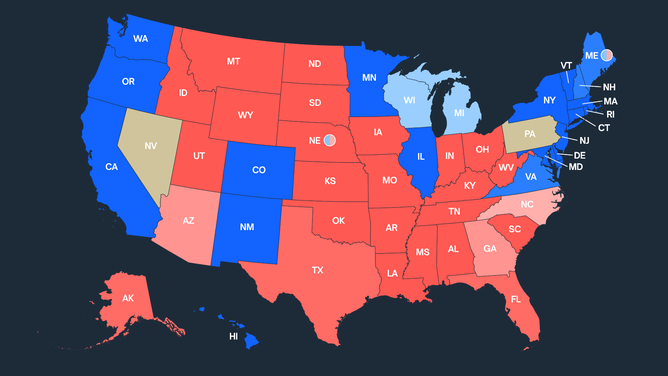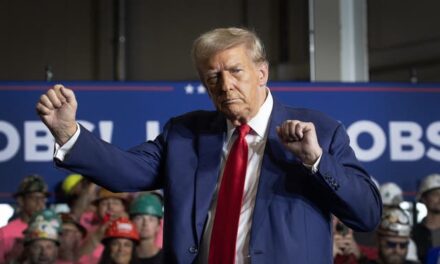We support our Publishers and Content Creators. You can view this story on their website by CLICKING HERE.
Donald Trump is once again the betting favorite to win the 2024 presidential election.
His lead is narrow. Polymarket, with a total of $1.2 billion bet on the election, gives Trump a 50 percent chance of winning as of publication, compared to 40 percent for Harris.
Here is a look at the betting market’s current electoral map projection:

In this scenario, Trump would lead Harris by 262 electoral votes to 251. And therein lies the change at the top. The market now gives Trump a 52 percent chance of winning the all-important state of Pennsylvania – which, in this model, would decide the outcome of the election.
Harris had led Trump in the state since Sept. 11, the day after the presidential debate, until Wednesday.
What does all of this mean? Let’s answer some questions:
1) Is the change an overreaction to the vice presidential debate?
Sort of … BUT.
JD Vance was remarkably superior to Tim Walz during Tuesday’s debate. Vance mopped the floor with Tampon Tim. Traditionally, vice presidential debates do not sway elections. However, there’s an argument that Vance’s performance was uniquely impactful.
See, Vance demonstrated that MAGA Republicans are not the weird, unhinged fascists that the media incessantly portrays them as. He showed that MAGA Republicans can be tame, sophisticated, and mild-mannered. To some voters on the fence, that mattered.
Could Vance have won over some undecided voters who support Trump’s policies but oppose his temperament?
In an election as narrow as 2024 projects to be, the answer is yes.
2) Is the betting market credible?
The public polling system in the U.S. is fractured. Public polling underestimated support for Trump by 9 points in 2016 and 5 points in 2020. Meanwhile, the betting market was eerily accurate in both years.
Public polling is not simply designed to measure voter perception. Public polling is also designed to voter perception.
For example, a left-leaning pollster may oversample independent women (who lean heavily toward Harris) as a means to convince Trump voters he has no chance in their state.
By contrast, the oddsmakers just want to make money. They are incentivized to set the lines as close to accurate as possible.
Further, as sports fans can attest, oddsmakers often obtain inside information to which the public is not privy – maybe even internal polling. Just saying.
3) Is Trump actually the favorite?
I discussed these questions with Stacy Washington on SiriusXM Patriot on Wednesday. I maintain, as I have since Biden bowed out of the race in July, that Harris will win Michigan, Wisconsin, and Minnesota and that Trump will win Arizona, Georgia, and North Carolina. So, like the market, I lean toward the “winner of Pennsylvania takes all” scenario.
Reminder, Biden won the state by just 80,000 votes in 2020.
There is a reason Harris has flip-flopped on the topic of fracking: the issue could cost her the state.
The Financial Times analyzed on Monday how voters in Pennsylvania do not trust Harris’ stance on shale gas:
“The state is a huge shale gas producer — and fertile ground for Trump, who is drawing fervent support from areas that account for a fifth of the country’s natural gas supply, and an industry that employs about 70,000 Pennsylvania.”
The piece cites a Philadelphia Inquirer/New York Times/Siena College poll from September 19 that showed 48 percent of Pennsylvania voters trusted Trump to do a better job on fracking than Harris, at 41 percent.
“In shale-rich Washington and Fayette counties, people who work in the industry or benefit from it worry Harris would use environmental regulations to strangle a sector struggling during a collapse in gas prices,” the piece elaborates.
“The US has risen to become the world’s biggest oil and gas producer during the Biden-Harris administration, but Sterbutzel and others in Pennsylvania’s shale patch think Democrats are hostile to their business.”
In addition, 51 percent of Pennsylvania voters say they trusted Trump to do a better job on the economy, compared with 46 percent for Harris.
Put simply, Trump will win Pennsylvania – and the election — if policy is the determining factor. That has been the case since Obama and Pelosi executed a coup to remove Biden from the ticket.
Trump is the stronger candidate on the economy, fracking, the border, crime, energy, and ending senseless wars. Is that enough to overcome deep state influences, the media, and the censorship industrial complex?
We will know in 33 days.

 Conservative
Conservative  Search
Search Trending
Trending Current News
Current News 





